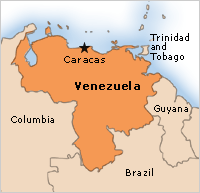
|  10° 30' North / 66° 58' West |
|
| ||
Oil war fears (Merco Press, May 5, 2005) Venezuelan troops with air and fluvial support plus elite intelligence units have been rushed to the oil-rich western region where sabotage actions have forced a considerable drop in production, announced Wednesday president Hugo Chavez. Venezuelan Defence Minister General Jorge Garcia revealed that last mid April security forces activated the "Black gold 25" plan because "the situation in the west has become somehow tricky: materials, equipments have been lost or stolen to sabotage and we're facing a "silent" strike from some oil workers. We've dispatched helicopters, motorboats, vehicles and troops to protect the oil fields and detect saboteurs". President Hugo Chavez claimed that the country's giant oil company PDVSA, Petroleos de Venezuela S.A. in the Maracaibo Lake region was pumping 100,000 barrels a day below the specified volume of approximately 1,2 million barrels per day. "There's people out in the west who insist in sabotaging us; we've discovered recurrent damage to valves, machinery and when this happens over and over, it's not an accident" blasted President Chavez adding that's why "we've sent the Army". The Rise of Black Propaganda and Dirty War Tactics (Again) (Venezuela Analysis, Mar 30, 2005) (Green Left Weekly / ZMag , Mar 15, 2005) Venezuela-Cuba Alliance? (ZMag , Mar 14, 2005) Venezuela a 'negative force'  Condoleezza Rice had harsh words for Cuba and Venezuelan President Hugo Chávez as she sketched out her Latin America policy at her Senate confirmation hearing. (The Miami Herald, Jan. 19, 2005) Condoleezza Rice had harsh words for Cuba and Venezuelan President Hugo Chávez as she sketched out her Latin America policy at her Senate confirmation hearing. (The Miami Herald, Jan. 19, 2005)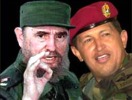 Will Not Tolerate U.S. Meddling The U.S. government must respect Venezuela's sovereignty and stop meddling if it wants to improve ties with its fourth-largest oil supplier, Foreign Minister Ali Rodriguez said. He was responding to comments by Secretary of State-designate Condoleezza Rice who at her Senate confirmation hearing criticized President Hugo Chávez for what she called his autocratic measures at home and his negative influence in the region. (Reuters, Jan. 19, 2005) (Financial Times, March 15, 2005) Senior US administration officials are working on a policy to "contain" Hugo Chávez, the Venezuelan president, and what they allege is his drive to "subvert" Latin America's least stable states. A strategy aimed at fencing in the government of the world's fifth-largest oil exporter is being prepared at the request of President George W. Bush and Condoleezza Rice, secretary of state, senior US officials say. The move signals a renewed interest by the administration in a region that has been relatively neglected in recent years. Roger Pardo-Maurer, deputy assistant secretary for western hemisphere affairs at the US Department of Defense, said the Venezuela policy was being developed because Mr Chávez was employing a "hyena strategy" in the region. Mr Pardo-Maurer said Washington has run out of patience: "We have reached the end of the road of the current approach." |
(Venezuelanalysis.com May 4, 2005) The deployment, known as "Operation Black Gold," involves over 1,000 soldiers. President Chavez confirmed today that he had approved of the action, in order to catch those who are responsible for the recent decline in oil production in western Venezuela. Venezuela's Defense Minister General Garcia Carneiro said, "A reserve battalion was activated in order to comply with security functions in all oil zones. Also, means were provided such as helicopters, vehicles, and boats that will carry out maintenance functions in the area." "This is a plan that goes against sabotage and is directed to preserve the installations and the entire system that belongs to [state oil company] PDVSA and the supply of gas and oil in Lake Maracaibo," added the General. (Vheadline News, April 01, 2005) (Washington Post, March 17, 2005) When Venezuelan President Hugo Chavez charged last month that the United States was developing plans to assassinate him, the U.S. State Department rejected the accusation as "wild." 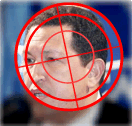 former CIA operative and prominent Bush supporter in south Florida, told Channel 22 in Miami that he had information about the administration's plans to "bring about a change" in Venezuela, possibly through "military measures." A video clip provided by Channel 22 shows host Maria Elvira Salazar pressing Rodriguez to be more specific. He makes clear he thinks the Bush administration will physically eliminate Chavez. Rodriguez's remarks cannot be dismissed as bombast. He is well known in Latin America for his role advising a Bolivian military unit that captured and executed Cuban revolutionary Che Guevara in 1967. He is well-connected with the Bush family. The memory of various White House-approved, CIA-sponsored conspiracies to assassinate Fidel Castro in the 1960s may have faded in Washington but they have not been forgotten in Havana or Caracas. Unveiled in Miami (Prensa Latina, March 15, 2005) The ex CIA agent, Félix Rodríguez, speaking to a television channel in Miami, Florida, confirmed that Washington would take economic and military actions against Venezuela, including assassination. Rodríguez said that he expected to participate in a CIA command to end with the life of the Venezuelan president. US military forces could launch a pre-emptive air strike to assassinate Chávez, he indicated. 
Caracas says the presence of these vessels may be part of "unannounced routine maneuvers" While Venezuela's President Hugo Chavez attends to the inauguration ceremony of Uruguay's leftist leader, Tabare Vazquez, in Montevideo, his Armed Forces are closely watching the unexpected presence of several US battleships near country's western coastline. On Monday, Venezuela's Navy commander, Armando Laguna, said that the Venezuelan Navy detected several foreign vessels 75 kilometers northeast of the Paraguana Peninsula in western Venezuela.(Pravda, Mar. 3, 2005) Silva from Maracaibo to Army 2-i-C (VHeadline News, Mar. 2, 2005) Oil Industry Shutdown Arrested (Venezuelanalysis.com, Mar 01, 2005) Venezuela's investigative police arrested fugitive labor leader Carlos Ortega in the early hours of Tuesday morning. A prominent leader of Venezuela's opposition to President Hugo Chávez, Ortega has been wanted by the Venezuelan police since 2003 on charges of treason and civil rebellion. Colombia (Jan. 26, 2005) |
Iraq provides a lot of lesson for a lot of countries. Venezuela promptly solved all its differences with Colombia. They do not like to make the same mistake Saddam did with Kuwait. Chavez of Venezuela learnt he really couldn't afford to irritate the Asians, the Europeans and the Central and South Americans. According to Venezuelan army Gen. Melvin Lopez Hidalgo, secretary of the National Defense Council, the armed forces (FAN) military doctrine is changing rapidly to prepare for asymmetrical war with America. According to General Lopez, Venezuela does not see Colombia as the main threat any more. It is United States that is perceived by Venezuela as the main threat. The doctrine calls for the creation of national reservist and civil defense forces to join the FAN in waging an asymmetrical war. The doctrine also includes a "social intelligence" civilian network that would include "taxi drivers, border residents, peasants, public sector workers and company employees," he said. Venezuela is arming its common citizens with arms and techniques to fight a covert war. They learnt from Iraq that they could never face America in the battleground. But their war will start after the fast and decisive apparent defeat with America if ever that situation arises. (India Daily, Jan 31, 2005) settlement of diplomatic rift Colombian and Venezuelan leaders on Saturday hailed the settlement of the diplomatic crisis aroused bythe capture of a Colombian rebel leader, saying the impasse was solved in a positive way. (Xinhua, Jan. 30, 2005) reconciliation after diplomatic rift The Andean Community (ANCOM) on Saturday welcomed the reconciliation between Colombia-Venezuela after a diplomatic crisis, hailing the end of the crisis as an evidence of the efficiency of the Andean mechanisms and the aspiration for regional integration. ANCOM Secretary General Allan Wagner described the reconciliation as a proof of the efficiency of the Andean mechanisms and the advantages of the negotiation and dialogue mechanisms among countries of the region. (Xinhua, Jan. 30, 2005) sheltered by Colombia (Jan. 21, 2005) (BBC News, Jan. 14, 2005) over a "violation of national sovereignty". |
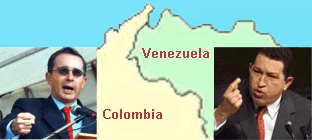 (AP, Jan 23, 2005) of provoking diplomatic crisis (Xinhua, Jan 24, 2005) (VHeadline, Jan 24, 2005)  (India Daily, Jan 23, 2005) (India Daily, Jan 19, 2005) must be formally requested by Colombia The Venezuelan government is to process the extradition request of the Colombian Revolutionary Armed Forces (FARC) leader known as "Chigüiro" when the Colombian government formally requests so, Monday said Venezuelan Foreign Minister Alí Rodríguez as quoted by news agency AFP. "As soon as the extradition is formally requested, we shall take all relevant steps in Venezuela and give an answer. But there must be a formal request," Rodríguez said when asked by reporters following the announcement made by the Colombian government. (El Universal. Mar. 14, 2005) (BBC News, Jan. 13, 2005) Venezuela calls back its ambassador to Colombia as a row over the capture of a Colombian rebel grows. (BBC News, Jan. 10, 2005) Police arrested Rodrigo Granda Escobar, the alleged liaison between the Revolutionary Armed Forces of Colombia, or FARC, and governments sympathetic to the Marxist rebel group. Escobar was reportedly caught in the Colombian town of Cucuta along the Venezuelan border. (Dec. 16, 2004) Slide Show (El Universal) |
Venezuela and BRIC Alliance Historic Oil Agreement  (Arab News, Mar. 6, 2005) (Arab News, Mar. 6, 2005) India and Venezuela signed a historic agreement yesterday, allowing Indian companies to take 49 percent stake in Venezuelan oil industry. Under the agreement, one of the six signed, Oil and Natural Gas Corporation and GAIL Ltd., India's largest energy companies, will be allowed to bid for exploration and production rights in Venezuela. While addressing reporters yesterday, Chávez said that Venezuela is keen to share its "oil potential" with India and over the past year has struck oil deals with various countries, including China. India's growth (Indo-Asian News Service, Mar. 4, 2005) Chávez, who is on a four-day visit to India, is seeking new markets to reduce Venezuela's dependence on the sale of oil to the US. "We want your oil corporation (ONGC Videsh Ltd.) to come to Venezuela to explore and exploit oil," he said, mooting the idea of a grand alliance with India and other countries that was less dependent on the US. A new Brazil-Venezuela alliance President Hugo Chavez' statements on the purchase of military Super Tucano aircraft from Brazil to equip the Venezuelan Air Force coincided with the signing of a strategic alliance with Brazil, through which Brazil significantly increased its presence in Venezuela via the most advantageous trade interchange that it has obtained on the continent. (UPI / MENAFN, Mar. 4, 2005) 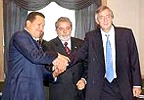 Presidents of Argentina, Brazil and Venezuela agreed Wednesday in Uruguay to promote energy integration and coordinate their stance vis a vis international multilateral organizations such as the International Monetary Fund. Nestor Kirchner, Luiz Inacio Lula da Silva and Hugo Chávez met following Tuesday's inauguration of Uruguay's first-ever Socialist president Tabare Vazquez. "Expectations we have are very high. All the agreements we can reach with Brazil, with Uruguay, with Venezuela, that will help lead to an integrated Latin America are very good. So I leave with high hopes" said President Kirchner. Three basic issues were addressed in the trilateral presidential summit: macroeconomic situation and social development; civil society; and energy integration. (Mercosur, Mar. 3, 2005)
Presidents of Argentina, Brazil and Venezuela agreed Wednesday in Uruguay to promote energy integration and coordinate their stance vis a vis international multilateral organizations such as the International Monetary Fund. Nestor Kirchner, Luiz Inacio Lula da Silva and Hugo Chávez met following Tuesday's inauguration of Uruguay's first-ever Socialist president Tabare Vazquez. "Expectations we have are very high. All the agreements we can reach with Brazil, with Uruguay, with Venezuela, that will help lead to an integrated Latin America are very good. So I leave with high hopes" said President Kirchner. Three basic issues were addressed in the trilateral presidential summit: macroeconomic situation and social development; civil society; and energy integration. (Mercosur, Mar. 3, 2005)
A Chinese-Venezuelan Petro Pact? The U.S.-Venezuela Oil Split Approaches A Boiling Point (Canadian Democratic Movement, Jan. 21, 2005) The biggest mistake in the history of American foreign policy... The footprint of Russia and China on South America has begun. On November 10, Russia took the lead role in coalition with China, India and Brazil to challenge the super-power supremacy of the US. Brazil and Venezuela are very open to the coalition concept where these large countries support each other in terms of trade, economics, international politics and defense. This coalition is composed of 75% of the world's population and 80% of its natural resources. Iran is about to join the coalition due to their US$200 billion energy deal with China. (VHeadline News, Dec. 30, 2004) | regional muscle  Flush with cash from high oil prices, Venezuela's president is pushing his leftist vision across the region.
Big buy: Venezuelan President Hugo Chávez met his Russian counterpart, Vladimir Putin, in Moscow last month. Chávez plans to purchase a large amount of Russian arms. Flush with cash from high oil prices, Venezuela's president is pushing his leftist vision across the region.
Big buy: Venezuelan President Hugo Chávez met his Russian counterpart, Vladimir Putin, in Moscow last month. Chávez plans to purchase a large amount of Russian arms. (The Christian Science Monitor, Dec. 20, 2004) 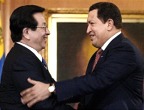 Venezuela President Hugo Chávez and Chinese Vice President Zeng Qinghong signed several agreements Saturday concerning oil, agriculture and technology, officials said. Chavez has sought to forge new trade and political ties with foreign powers including China and Russia. Venezuela President Hugo Chávez and Chinese Vice President Zeng Qinghong signed several agreements Saturday concerning oil, agriculture and technology, officials said. Chavez has sought to forge new trade and political ties with foreign powers including China and Russia. and the West – Chavez gives China free access to oil resources (India Daily, Dec. 29, 2004) Bilateral trade between Venezuela and China will reach 3 billion US dollar in 2005, double this year, President Hugo Chávez said on his return to Venezuela following a five-day official visit to Beijing which was also another strategic move to lessen dependency from the "dominating regional power". (Dec. 28, 2004) to Reduce Dependency on US Market (Dec. 25, 2004) 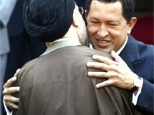 (MNA, Mar 11, 2005) (MNA, Mar 11, 2005) industrial ties with Iran A Venezuelan delegation headed by Popular Economy Minister Elias Jaua on Tuesday visited several industrial units in Khorasan Razavi province. (Dec. 23, 2004) in the Latin-America (Nov. 25, 2004) President Hu Jintao's visit to Brazil, Argentina, Chile and Cuba was of great importance, which is also the first state visit to the four Latin American countries by the new top leader of the Chinese Government. It marks a new milestone in the history of China-Latin America friendship. The visit yielded plentiful and substantial fruits in the exchanges in various fields such as politics, economy, culture, education, and technology. In total 39 documents for cooperation were signed. PR China Ministry of Foreign Affairs, Press conference on America's Backyard Asia Media, Nov. 26, 2004 Xinhua (Nov. 29, 2004) Boosting economic ties Monday Morning, Lebanon (Dec 2, 2004) "best period of history": Experts With frequent high-level visits and billions of US dollars worth economic and trade cooperation, China and Latin America ties have entered "best period in history",Chinese experts say. Brazil, Argentina, Chile, Peru and Venezuela announced the recognition of China's full market economy status, and China classified Brazil, Argentina, Mexico, Chile and Peru as tourist destination which will allow Chinese tourists to travel to those countries. "Latin American countries are sharing great benefits from China's soaring economy, and great potential still remains. It's the best period of history in China-Latin American ties," said Jiang Shixue. (Xinhuanet, Dec. 27 2004) |

in Latin America? When I recently interviewed Roger Noriega, the top State Department official in charge of Latin American affairs, I was surprised that he played down reports that Venezuelan President Hugo Chávez plans to buy 50 Russian MiG-29 planes, risking a new arms race in Latin America. "There are other countries in the region that have those kinds of weapons, which leads me to believe it would not necessarily represent a military escalation," Noriega said, apparently referring to past MiG-29 purchases by Cuba and Peru. The Bush administration may be playing down the MiG-29 reports because it does not want to give Chávez any excuse to further clamp down on domestic dissent. Or it may not want another foreign policy crisis before the Nov. 2 election. But, if the MiG-29 sale goes through, Colombia, Brazil and other neighboring countries will want to catch up. And following the 1997 U.S. government decision to lift a two-decade ban on sophisticated weapons sales to Latin America, U.S. arms peddlers will soon be touring the region with dire predictions about the "Venezuelan threat." It's an insane scenario in a region with 42 percent poverty rates, but one that can't be ruled out. (The San Diego Union-Tribune, Oct. 22, 2004) for double standards on arms deal Venezuela on Thursday rebuffed the latest US charges of its arms deal, saying Washington is applying double standards to the issue. Venezuelan Vice President Jose Rangel told a press conference that the United States has two completely different criteria on arms purchases by Venezuela and Colombia. Rangel said his country made the deal as part of a plan to reinforce its border security, rather than for an arms race as claimed by Washington. "Colombia has just announced it will buy 22 combat planes. Is this an arms race?" he asked. (Xinhua, Mar. 18, 2005) In a signing ceremony broadcast in Venezuelan television, Defense Minister General Jorge Garcia said "these are high-performance machines, which meet our needs ... our air force already has US, French and Austrian helicopters ... these helicopters will be used to police the border." Venezuela, however, rejects the criticism pointing to the United States' own military build-up in Colombia and ever-increasing threats from Washington D.C., focused on an insatiable thirst for Venezuela's oil ... nevertheless, Russia and Venezuela are also negotiating further Russian arms sales and an agreement is expected to be completed very shortly. (Vheadline, Mar 10 2005) Venezuela's MiGs purchase The Moscow Times, Dec 2, 2004 fighter jets deal: Unidentified (?) Bush administration official belligerently says "We shoot down MiGs!" VHeadline News, Dec 1, 2004 We Shoot Down MiGs Washington Post, Dec 1, 2004 MosNews, Dec 1, 2004 Venezuela arms build-up Financial Times, Dec 1, 2004 About Venezuela Arms Plans Reuters, Nov 30, 2004 Washington Post, Nov 30, 2004 and Migs as Colombia looks on nervously Financial Times, Nov 30, 2004 a lot of Russian weapons China Daily, Nov 27 2004 on strategic alliance with Russia RIA Novosti, Nov 26, 2004 Relations with Russia Venezuelanalysis.com, Nov 26, 2004 not for arms race: Venezuela Xinhua via China View, Nov 9, 2004 to Fight Guerillas MosNews, Sep 23, 2004 50 Russian Mig-29 Fighters MosNews, Sep 17, 2004 Threaten US Supremacy in Air Power —General MosNews, Jun 24, 2004 | 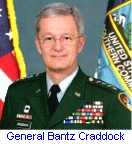 50 new Mig 29 warplanes General Bantz Craddock, the commander-in-chief of the U.S. Southern Command (SOUTHCOM), the U.S. military's senior officer responsible for security cooperation in Latin America has warned of the potential for regional destabilization arising from Venezuela's recent arms procurement program. Recent purchases include 50 latest-generation Mig-29 warplanes to dozens of helicopter gunships, 100,000 Kalashnikov automatic rifles
(The Washington Times, March 18, 2005) in War of Words between Venezuela and the U.S. The International Relations Advisor to Brazil's President Lula, Marco Aurelio García, defended Venezuelan President Hugo Chávez yesterday against harsh criticisms made by the Bush Administration, asserting that the criticisms were "ill informed" and that Chávez "is not only a democratic president, but he has also reaffirmed twice his democratic character" in the recall referendum and in the last regional elections. According to Aurelio García, "although the current situation is no different," the attitude of the US government has taken a 180 degree turn from when they worked with Brazil in the "Group of Friends of Venezuela." He contends that this change in policy and these hostile remarks are unjustified. Aurelio García, who also mediated in the "Granda Affair" between Venezuela and Colombia, singled out comments made by Roger Pardo-Maurer, the Deputy Assistant Secretary for Western Hemisphere Affairs at the Department of Defense, as being particularly unsubstantiated. While speaking to a group of US senators on Tuesday, Pardo-Maurer alluded to a possible US policy change towards the oil-rich nations. "We have expressed our concern about actions taken by the Venezuelan government… and also about Venezuela's intentions in the region… we have reached the end of the road with the current approach." Venezuela's Ambassador to the United States, Bernardo Alvarez, recently expressed concern, in an interview with Dow Jones Newswires, that the intensification of US criticisms may indicate a "a policy change [that] might mean going back to the policies of the Cold War that created so much trouble in Central America, and so much discontent within the United States." Alvarez was particularly alarmed by recent remarks made by Pardo-Maurer as well, but not only for what he referred to as a "very simplified and distorted view of Venezuelan reality." In the midst of a slew of statements from Pentagon and State Department Personnel, Alvarez explained, Pardo-Maurer's comments stuck out in his mind for another reason: his close affiliation with the Nicaraguan "Contras." "We are worried that in the development of a new policy a person who was involved in the insurgence against the Sandinista government might participate," Alvarez stated. During the inauguration ceremony for the Regional Information Office in the state of Zulia yesterday, Andrés Izarra, Venezuela's Minister of Communication and Information, reiterated the position expressed last Sunday by Chávez on his weekly television show, Aló Presidente, that US foreign policy should be aimed at "strengthening and normalizing relations with Venezuela." The Minister went on to add that he hoped that the declarations coming from Washington belong to a handful of "isolated spokespeople" that "in no way" represent United States' foreign policy. General Raúl Isaías Baduel, the Commander of Venezuela's Army, not only expressed his concern over U.S. policy towards Venezuela, but also towards the entire region. Baduel considers that US military aid to Colombia creates a significant disequilibrium between the armed forces of two countries, which, considering the nature of the Colombian conflict, is natural – but only up until a certain point. When questioned as to Venezuela's decision to replace their 50 year old Belgian rifles with more modern, sophisticated Russian models, Baduel replied, "Venezuela is pacific… Venezuelans have the right to not be a target of the consequences of this violence." Baduel went on to affirm that this is a "sovereign decision" of Venezuela and "we are respectful of the sovereign decisions of other countries and because of this we ask for respect for our own decisions." Venezuela's Vice-President José Vicente Rangel concurred with Baduel in that "Venezuela is not arming itself," justifying the country's recent arms purchases from Russia and Brazil based on the need to defend itself. He assured that Venezuela is not interested in any type of conflict with any country, especially not with the United States. "President Chávez has already said it. We don't want a fight, we don't want to confront the United States…" According to Rangel, there are "hawks" in Washington who have a "deliberate and calculating policy of provoking Venezuela." Rangel said he believes that the daily slew of statements made by Washington are based on "contaminated" information from "mercenaries of the opposition," and that the United States would take an entirely different position if they took the time to directly observe the Bolivarian process and the changes it has instigated in Venezuela. In another statement by a high level U.S. official against the Venezuelan government today, CIA Director Porter Goss classified Venezuela as a "potential foci of instability," reiterating that Chávez is "consolidating his power with technically legal tactics against his opponents," and that he is intervening in the internal affairs of other countries, "supported by Cuban President Fidel Castro." (Venezuelanalysis, Mar 18, 05) |
|
A Straight (From the Hip) Answer: We Shoot Down MiGs There was one of those "background briefings by a senior administration official". The White House e-mailed the transcript to reporters, but didn't put it on the Web site. Here's an excerpt: "Q My question is. . . . a question about the Chávez arms purchases from Russia, whether or not this is an issue of any concern to the U.S. It seems to be an issue of concern to the Colombians. "Senior Administration Official: It should be an issue of concern to the Venezuelan people. Millions of dollars are going to be spent on Russian weapons for ill-defined purposes. "Q Can I just follow up? What is your understanding of the purpose of the MiG purchases? "Senior Administration Official: My understanding is that they're looking to upgrade their fighter fleet, and they've decided that MiGs might be the fighter to purchase. "Q And that is -- is there a concern for the U.S.? "Senior Administration Official: Let me put it this way: We shoot down MiGs." Well, OK then. That's certainly a bit more of a direct answer than we're used to. |
James Harding and Andy Webb-Vidal wrote hours later in the Financial Times: "The forthright remark
was quickly clarified by Sean McCormack, the National Security Council spokesman at the White House,
who said the comment simply reflected the fact that Venezuela's arms build-up 'is clearly an issue
that we monitor closely'. "But the unequivocal criticism of Venezuela's arms purchases underscores Washington's hostility towards the Chávez government and concern that Russia is arming a country viewed by the US as a destabilising force in the region. "At the end of a visit to Moscow last weekend, Mr Chávez said his government would take delivery of 40 helicopters from Russia and he had agreed to buy 100,000 semi-automatic rifles. The move is expected to be followed by Venezuela's acquisition of the most advanced model of the Mig-29 fighter jet. Reports in recent weeks suggest Mr Chávez wants as many as 50." As Milbank and Struck also pointed out, the same official -- in contrast to Bush's statement that he had asked for an expedited decision on whether to lift the beef ban -- said a decision on beef was months away and said another big dispute, about U.S. tarifss on Canadian softwood, was "eternal." Who is this guy? (Source: Washington Post Dec 1, 2004) |
 United States
United States

